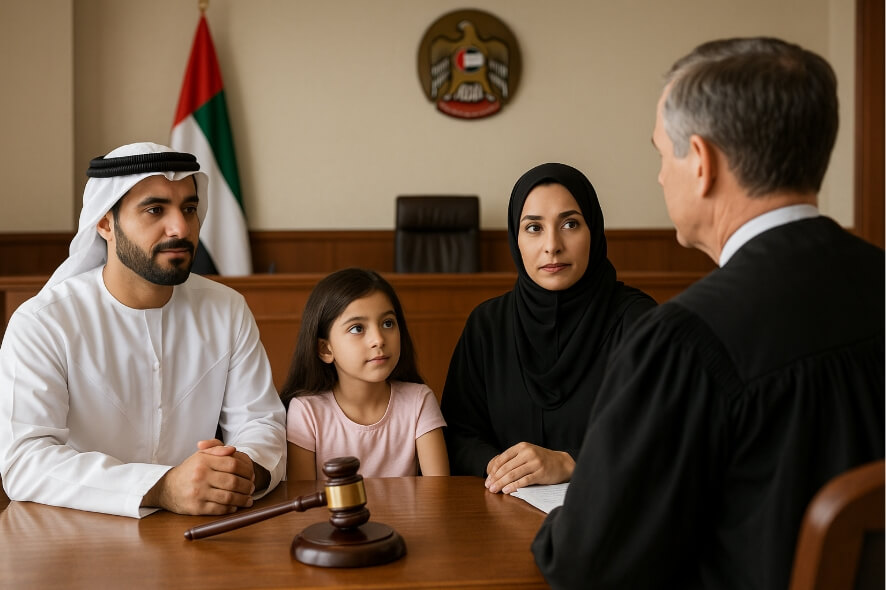Legal blog
UAE Personal Status Law 2024: Key Reforms for Muslim and Civil Families

In April 2025, the United Arab Emirates enacted Federal Decree-Law No. 41 of 2024, introducing sweeping reforms to the personal status law applicable to Muslims residing in the country.
This legislative update marks a significant shift in family law, aiming to strengthen family stability, ensure children's welfare, and align more closely with contemporary societal needs, while preserving core Islamic principles.
The law also intersects with provisions relevant to civil marriages, offering a comprehensive framework for both Muslim and non-Muslim residents.
Key Developments Under the New Law:
1. Custody Age and Child’s Best Interest
The law has unified the age of maternal custody for both boys and girls to 18 years. This change replaces the previous framework, where custody ended at age 11 for boys and 13 for girls. Additionally, once a child reaches the age of 15, they may express their preference regarding custodianship, which the court may consider in light of the child's best interests. This approach modernizes custody determination by focusing more on psychological and developmental stability.
2. Alimony and Financial Support
The law emphasizes a just and realistic approach to alimony, ensuring that financial maintenance reflects the dependent spouse's needs, the financial capability of the paying party, and the standard of living during the marriage. In cases of increased alimony awards, the judgment can be applied retroactively for up to six months; however, reductions apply only from the date of the ruling.
3. Marriage Requirements
The minimum legal age for marriage is now 18 years (Gregorian calendar). If one or both parties are underage, court permission is required following a determination that the marriage is in the best interest of the minor. In cases where the age gap between spouses exceeds 30 years, judicial approval is also mandatory, emphasizing the protection of vulnerable parties.
4. Divorce Grounds and Procedures
New causes for divorce have been incorporated, including substance abuse or addiction and chronic illness that prevents marital cohabitation. If a spouse is afflicted with a medical condition that renders them incapable of fulfilling marital duties, the other party may seek divorce after a one-year grace period for treatment.
5. Civil Marriage Provisions
The UAE now offers streamlined civil marriage procedures for non-Muslim residents, guaranteeing full legal recognition and clear articulation of rights and obligations. These reforms directly impact custody, inheritance, and financial settlements in cases of separation.
6. Inheritance and Testamentary Rights
The new law allows for inheritance between individuals of different religions, including mechanisms to ensure the equitable distribution of assets when direct ownership is not possible due to religious differences.
7. Family Courts and Dispute Resolution
Specialized family courts have been established to address personal status matters efficiently. The role of family guidance centers has been enhanced to promote amicable resolution before formal litigation. This aims to reduce caseloads and ensure faster outcomes in urgent matters such as child custody or alimony.
8. Women’s Legal Empowerment
The law reaffirms a woman’s right to manage her own financial affairs independently and provides stronger legal grounds for seeking divorce if agreed-upon marital terms are breached. These provisions represent a significant advancement in legal protections for women within marriage and post-divorce.
Conclusion
The new UAE Personal Status Law underscores the country's commitment to legal modernization and social equity. It establishes a clear, inclusive framework that balances traditional values with progressive protections. Whether addressing Muslim families or expatriate civil marriages, the law provides tools to resolve disputes fairly and in alignment with best practices.
Given the complexity and depth of these reforms, individuals are strongly encouraged to seek expert legal consultation to fully understand their rights and obligations. A well-informed legal strategy today may prevent considerable emotional and financial challenges tomorrow.
Written by:
Mohamed Yasser Kasem | Othman Almarzooqi Advocates and Legal Consultations

This publication is for general information purposes only. It does not purport to provide comprehensive full legal or other advice.
Legal Advice Middle East and the contributors accept no responsibility for losses that may arise from reliance upon information contained in this publication. This publication is intended to give an indication of legal issues upon which you may need advice.
Full legal advice should be taken in due course from a qualified professional when dealing with specific situations.











